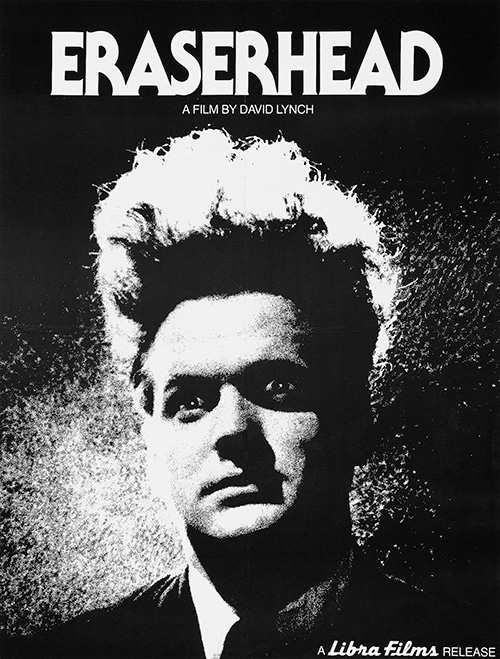Eraserhead

Director: David Lynch
Release Date: 1977
Should this be on the list?
This belongs, if for no other reason than the sheer chutzpah it took to actually make it.
Rating: 4 Stars out of 5
Would I watch this again?
This is one of those movies that begs repeated viewing, just to figure out what may (or may not be) going on.
David Lynch just passed away yesterday. He will probably be best remembered for Twin Peaks, but he is also responsible for four movies on the 1001 Movies You Must See Before You Die, including Mullholland Drive, The Elephant Man, and Blue Velvet. And this movie, his first theatrical release, which continues to baffle and amaze viewers to this day.
As it was his first full-length feature, Lynch made this on a shoestring budget, produced through help of the American Film Institute and donations from cast members. Jack Nance (pictured on the poster) was hired to play the principal role of Henry Spencer in 1971, six years before the film saw the light of day. During the years-long production, Nance kept that same hairstyle to keep continuity. Lynch wrote, directed and produced, basing the look of the film on the five years he spent in a rough neighborhood in Philadelphia.
Sun Ra once referred to Philadelphia as “death’s headquarters” in the mid-60’s, and Lynch was true to that vision.
To describe the plot is a bit of a challenge, but all you really need to know is that Henry is told by his girlfriend Mary that she is going to have a baby. She gives birth, but it’s not exactly human, but more of a thing, The constant noise the “child” makes drives Mary crazy and she leaves Henry to take care of the “baby” himself. Then he starts to see visions of a woman who lives in his radiator, who sings. He imagines the baby’s head on his own body, while his own head falls from the sky and breaks, later taken to a factory where it is used to produce erasers. Eventually he stabs the “baby” with scissors, the lights flicker and go out, and a lot of other things happen from there, Henry is embraced by the Lady in the Radiator, and then it’s over.
That’s clear, isn’t it?
Lynch said in later interviews that this movie was a reaction to his own turn at fatherhood and the fears that he had. If you go into the movie with that perspective, it certainly makes more sense, but I guess that’s not the point. The beauty of David Lynch’s movies isn’t necessarily about them making sense. You could, and can, enjoy his movies for no other reason than they look and feel like nobody else’s movies. The black-and-white photography of Eraserhead, whether it be from a lack of budget or from sheer genius, looks like nothing else. Parts of it, and Mullholland Drive later on, defy you to understand them, and yet, it doesn’t matter. It’s just undeniably interesting.
It took me a while before I watched this one, because I wasn’t sure exactly what I was going to get into, but one night, when I couldn’t sleep, this seemed like the perfect movie to watch. I remember pressing ‘play’ on the remote and thinking, after watching precisely thirty seconds of movie, that I had made a grave error in judgement. But as it turns out, it was a bit like watching a dream while you’re actually awake. Not a good dream, not one that you would want to be a recurring dream, and you could probably consider it a nightmare, but still in all, true to the form of a dream itself. And although I had a million questions afterwards, none of them seemed to keep me awake after that.
I’ll probably watch this again, just to figure out one or two things he had to say or not, and if I do, the middle of the night during a bout of in insomnia seems like the perfect way to do it.
Rest in peace, Mr. Lynch. You were truly original.